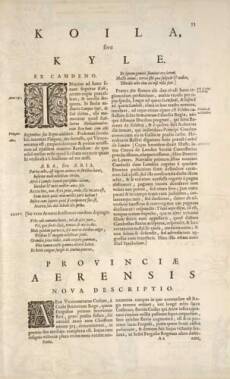Blaeu Atlas of Scotland, 1654
| Field | Content |
|---|---|
| Name: | Blaeu, Joan, 1596-1673 |
| Title: | Koila sive Kyle; Provinciae Aerensis Nova Descriptio |
| Pagination: | 53 |
| Zoom view: | Click on the image to view in greater detail |
| 64 / 162 Scroll through pages: 


 | |
Translation of text:
KOILA
or
KYLE
FROM CAMDEN (Section Note)
Further into this bay there follows Kyle, excelling in abundance of material and well populated. In the addition to Bede it is called Plain of Cyel and Coil, where it is recalled that [in the year 750] ‘Eadbert King of the Northumbrians added this with other regions to his kingdom.’ In Ptolemy’s period Vidogora was known here, perhaps Ayr, which is a Sheriffdom, a small market town, and a well-known port on the small river of the same name. Nothing better occurs to me to write about it than these verses sent to me by J. Johnston. (Section Note)
AYR, or AIRYA small city, but a large spirit clings to its strong people,
Inferior to none in the nobility of its men.
Most pure, it draws its climate from the plains of the air
And a lighter breeze rests on its gentle soil.
Hence I believe it was called Airy before Ayr,
For what right does lightness have with harshness?
But if one may compare lower thing with higher,
Perhaps it should have been first called Aureate.
[Arthur Johnston depicts it thus:
City content with the goods of heaven, either from the pure air
Or from the bronze by which you may be called, you draw your name.
Indeed you are small in size, but you increase size with gifts,
And you are in front of large cities in nobility.
You look at huge stones, at gems of little body.
Yet the little gem has more lustre.
And Jove’s oak rises from a little seed,
And the seven mouths of the twin river are hidden.
Increase in spirit: she who subjected to herself lands and seas,
The city of the Tiber was once no more than a villa.]
Besides the River Ayr two other streams flow through this region, with many villages scattered on their banks: the Lugar and the Cessnock, on which respectively the Crawfords and the Campbells, famous names in this area, live; on the former’s bank also is Ochiltree Castle, the seat of the Stewarts of the Royal Family, and likewise progenitors of the Dukes of Albany, who are from it Barons of Ochiltree; from thisfamily was that Robert Stewart, who was the inseparable companion of the Prince of Condé and was slain in battle with him in France. With the hereditary dignity of Bailie, Campbell of Loudoun is in charge of it. [Their heiress was married to the illustrious John Earl of Loudoun, Chancellor of Scotland, most distinguished and eloquent, son of the Lord of Lawers. It is said that the first of that name of Campbell, asked while at London by a certain Lady to defend her chastity, undertook the contest; but she, led by her conscience, approached him and confessing that she had been seduced asked him to abstain from fighting; yet he neither wished nor was able to withdraw from the duel, but it was much too late; for they were already prepared and on the field with the judges; he entered the contest, but turning aside, until assailed by his opponent and asked why he turned aside from the duel, he replied, ‘I bide my time’, that is, I wait for my opportunity; the other, annoyed at this, called him a whore’s son; as soon as Campbell heard this word, he replied, ‘Let this be the reason for our contest, for you lie’; and he not only defended himself but attacked his opponent and killed him. Hence still today that is their motto.]
A NEW DESCRIPTIONOF THE PROVINCE
OF AYR
The Sheriffdom of Ayr embraces in its midst Kyle, named from Coil, King of the Britons, whom Fergus, first King of the Scots, defeated in a severe battle and killed there in 325 B.C. Several monuments of this famous victory are even now in existence. The plain in which it was fought retains the King’s name; and not far off the church of Coylton; the River Kyle, which flows into the Ayr about four miles above the market-town, quite a famous name for the river; there is also in the vicinity Fergus Loch, near which the Scots pitched camp, and finally it was by the good fortune of that battle, that the Scots offered the kingship to Fergus


